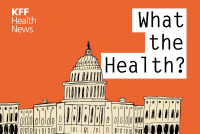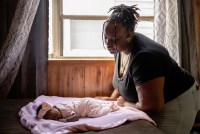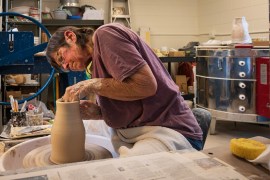Latest KFF Health News Stories
En California, la cobertura de salud ampliada a inmigrantes choca con las revisiones de Medicaid
El proceso de redeterminación ha afectado de forma desproporcionada a los latinos, que constituyen la mayoría de los beneficiarios de Medi-Cal.
California’s Expanded Health Coverage for Immigrants Collides With Medicaid Reviews
A state policy to extend Medi-Cal to qualified Californians without legal residency is running up against a federal requirement to resume eligibility checks. The redetermination process is causing many Latinos, who make up a majority of Medi-Cal beneficiaries, to be disenrolled.
Rapid Rise in Syphilis Hits Native Americans Hardest
With U.S. syphilis rates climbing to the worst level in seven decades, public health experts and the federal Indian Health Service are scrambling to detect and treat the disease in Native American communities, where babies are infected at a higher rate than in any other demographic.
Watch: Many Americans Are Unaware of HIV Prevention Medication
Some Americans mistakenly believe medication to prevent HIV transmission through sex is just for certain groups such as gay men, but anyone who’s at risk for contracting HIV through sex could benefit.
A New Orleans Neighborhood Confronts the Racist Legacy of a Toxic Stretch of Highway
New federal funds aim to address an array of problems created by highway construction in minority neighborhoods. These are economic, social, and, perhaps above all, public health problems. In New Orleans’ Treme neighborhood, competing plans for how to deal with harm done by the Claiborne Expressway reveal the challenge of how to mitigate them meaningfully.
Why Even Public Health Experts Have Limited Insight Into Stopping Gun Violence in America
After the 1996 Dickey Amendment halted federal spending on research into firearms risks, a small group of academics pressed on, with little money or political support, to document the nation’s growing gun violence problem and start to understand what can be done to curb the public health crisis.
Journalists Examine Medicaid Unwinding, Farmworkers’ Mental Health, and the Big Opioid Payback
KFF Health News and California Healthline staff made the rounds on national and local media this week to discuss their stories. Here’s a collection of their appearances.
California Lawsuit Spotlights Broad Legal Attack on Anti-Bias Training in Health Care
State laws requiring doctor training on how bias affects treatment violate teachers’ right to free speech, opponents say.
La FDA finalmente prohibiría peligroso químico en productos para alisar el cabello
El primer estudio que vinculó los alisadores de cabello con el cáncer de útero, publicado en 2022, encontró que el uso frecuente de estos químicos duplica con creces el peligro.
FDA’s Plan to Ban Hair Relaxer Chemical Called Too Little, Too Late
The FDA’s recent notice that it would move to ban formaldehyde in hair-straightening products comes more than a decade after researchers raised alarms about health risks. Scientists say a ban would still leave many dangerous chemicals in hair straighteners.
Native American Communities Have the Highest Suicide Rates, Yet Interventions Are Scarce
Native Americans die by suicide at a higher rate than any other racial or ethnic group, yet research into effective and culturally appropriate interventions is uncommon.
Rising Suicide Rate Among Hispanics Worries Community Leaders
The suicide rate for Hispanics in the United States has increased significantly over the past decade. The reasons are varied, say community leaders and mental health experts, citing factors such as language barriers, poverty, and a lack of bilingual mental health professionals.
Líderes comunitarios alarmados por el aumento de la tasa de suicidios en hispanos
Incluso niños hispanos en edad escolar han intentado hacerse daño o han expresado pensamientos suicidas, indican investigaciones.
KFF Health News' 'What the Health?': The Supreme Court vs. the Bureaucracy
The Supreme Court this week heard oral arguments in a case that could radically alter the way federal agencies — including the Department of Health and Human Services — administer laws passed by Congress. A decision in the case is expected this spring or summer. Meanwhile, the Biden administration is struggling over whether to ban menthol cigarettes — a move that could improve public health but also alienate Black voters, the biggest menthol users. Joanne Kenen of Johns Hopkins University and Politico Magazine, Lauren Weber of The Washington Post, and Rachel Cohrs of Stat join KFF Health News chief Washington correspondent Julie Rovner to discuss these issues and more. Also this week, Rovner interviews Darius Tahir, who reported and wrote the latest KFF Health News-NPR “Bill of the Month” feature about a lengthy fight over a bill for a quick telehealth visit.
Women and Minorities Bear the Brunt of Medical Misdiagnosis
Hundreds of thousands of Americans become disabled or die each year because of a diagnostic error. But some patients are at higher risk than others.
These Patients Had to Lobby for Correct Diabetes Diagnoses. Was Their Race a Reason?
Adults who develop one autoimmune form of diabetes are often misdiagnosed with Type 2 diabetes. Those wrong diagnoses make it harder to get the appropriate medications and technology to manage their blood sugar. Many Black patients wonder if their race plays a role.
Being Black and Pregnant in the Deep South Can Be a Dangerous Combination
Being Black has always been dangerous for pregnant women and infants in the South. And researchers say things are continuing to move in the wrong direction.
Encuesta revela que persiste la discriminación racial en la atención médica
Casi la mitad de los pacientes hispanos, los Indio americanos y los nativos de Alaska sienten que no se los respeta.
Many People of Color Worry Good Health Care Is Tied to Their Appearance
Many people from racial and ethnic minority groups brace themselves for insults and judgments before medical appointments, according to a new survey of patients that reaffirms the prevalence of racial discrimination in the U.S. health system.
Backlash to Affirmative Action Hits Pioneering Maternal Health Program for Black Women
A San Francisco program offers a $1,000-a-month stipend for pregnant Black and Pacific Islander women, part of an effort to address severe racial disparities in maternal health. But conservative groups have sued to shut down the Abundant Birth Project, part of a national backlash against affirmative action in health care.




















